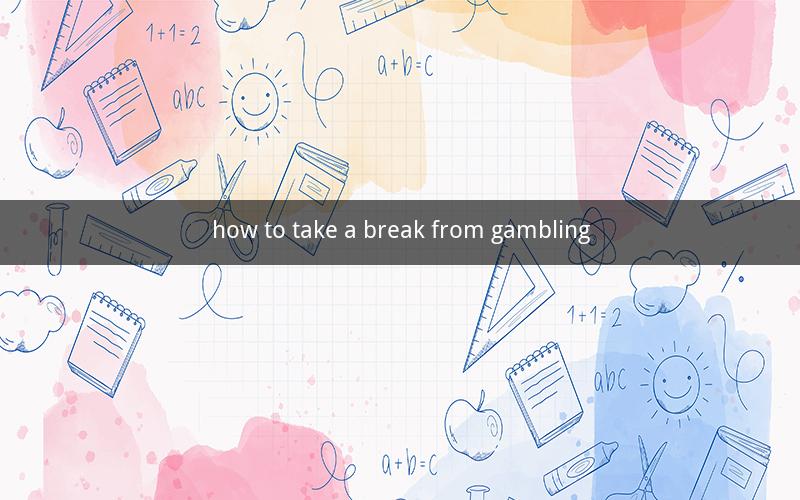
How to Take a Break from Gambling: A Comprehensive Guide
Table of Contents
1. Understanding the Importance of Taking a Break
2. Identifying the Signs of Problem Gambling
3. Setting Realistic Goals for Taking a Break
4. Creating a Support System
5. Developing Strategies to Avoid Temptation
6. Engaging in Alternative Activities
7. Seeking Professional Help
8. Utilizing Online Resources and Tools
9. Learning from the Experience
10. Maintaining Long-Term Sobriety
1. Understanding the Importance of Taking a Break
Gambling can be an exhilarating and entertaining activity, but it can also lead to addiction and financial, emotional, and social problems. Taking a break from gambling is crucial for those who recognize the signs of problem gambling and wish to regain control over their lives. This guide will explore various strategies to help individuals take a break from gambling and maintain a healthy lifestyle.
2. Identifying the Signs of Problem Gambling
Before taking a break, it is essential to recognize the signs of problem gambling. These may include:
- Feeling restless or irritable when not gambling
- Needing to gamble with increasing amounts of money to achieve the desired excitement
- Repeated unsuccessful efforts to control, cut back, or stop gambling
- Gambling when you are feeling sad, lonely, or bored
- Lying to family members, therapists, or others to conceal the extent of your gambling
3. Setting Realistic Goals for Taking a Break
Setting realistic goals is the first step in taking a break from gambling. These goals should be achievable and measurable. For instance, you might aim to take a one-week break from gambling or to limit your gambling sessions to a specific number of hours per week.
4. Creating a Support System
A strong support system can make a significant difference in your journey to take a break from gambling. This may include friends, family, or support groups such as Gamblers Anonymous. Sharing your struggles and goals with others can provide motivation and emotional support.
5. Developing Strategies to Avoid Temptation
Identifying triggers that lead to gambling can help you develop strategies to avoid temptation. These may include:
- Removing access to gambling websites and apps
- Unsubscribing from gambling-related newsletters and advertisements
- Avoiding places where gambling is prevalent, such as casinos or sportsbooks
- Informing friends and family about your commitment to take a break so they can help you avoid temptation
6. Engaging in Alternative Activities
Finding alternative activities to fill the void left by gambling can be beneficial. Consider hobbies, exercise, or socializing with friends and family. Engaging in these activities can help you stay occupied and reduce the urge to gamble.
7. Seeking Professional Help
If you find it challenging to take a break from gambling on your own, seeking professional help is essential. Therapists, counselors, and addiction specialists can provide personalized guidance and support.
8. Utilizing Online Resources and Tools
Several online resources and tools can help you take a break from gambling. These may include:
- Gamblers Anonymous online meetings
- Online support groups
- Self-help apps and websites
- Time management tools to track your gambling habits
9. Learning from the Experience
Taking a break from gambling is an opportunity to learn about yourself and your habits. Reflect on your experiences and identify areas for improvement. This self-awareness can help you maintain long-term sobriety.
10. Maintaining Long-Term Sobriety
Maintaining long-term sobriety requires dedication and commitment. Stay focused on your goals, seek support when needed, and be patient with yourself. Remember that taking a break from gambling is a journey, not a destination.
Questions and Answers
1. Q: How long should I take a break from gambling?
A: The duration of your break depends on your personal goals and circumstances. Some people may find a one-week break sufficient, while others may need a longer period to overcome their addiction.
2. Q: Can I still gamble socially during my break?
A: It is essential to be strict with your goals and avoid any form of gambling during your break. Social gambling can trigger cravings and hinder your progress.
3. Q: What if I relapse during my break?
A: Relapse is a common part of the recovery process. If you relapse, do not be discouraged. Analyze the triggers that led to the relapse and seek support to help you get back on track.
4. Q: How can I stay motivated during my break?
A: Stay connected with your support system, engage in alternative activities, and remind yourself of the reasons why you decided to take a break.
5. Q: Can I use online resources to help me take a break from gambling?
A: Yes, numerous online resources and tools are available to help you take a break from gambling. These resources can provide support, guidance, and motivation.
6. Q: Is it possible to overcome gambling addiction on my own?
A: While some individuals may overcome gambling addiction on their own, seeking professional help can significantly improve your chances of long-term sobriety.
7. Q: How can I tell if I have a gambling problem?
A: If you find yourself struggling to control your gambling, feeling restless or irritable when not gambling, or lying about your gambling habits, you may have a gambling problem.
8. Q: Can taking a break from gambling improve my mental health?
A: Yes, taking a break from gambling can improve your mental health by reducing stress, anxiety, and depression associated with problem gambling.
9. Q: What should I do if I feel overwhelmed during my break?
A: If you feel overwhelmed, reach out to your support system, seek professional help, or take a short break from your efforts to regain control over your gambling.
10. Q: How can I maintain long-term sobriety after taking a break from gambling?
A: Maintaining long-term sobriety requires dedication, commitment, and a strong support system. Stay focused on your goals, seek support when needed, and be patient with yourself throughout the process.